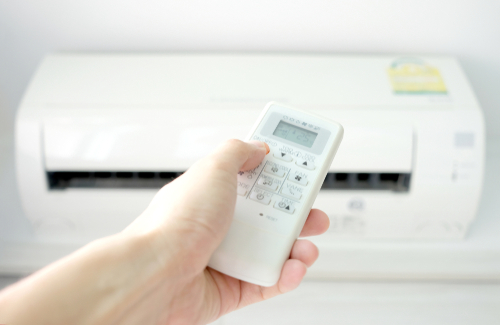
The Role Of Aircon Servicing In Mold Risk Reduction
February 26, 2023
How Aircon Maintenance Helps You Stay Cool in Humid Singapore
May 30, 2023The Effects of Dirty Aircon Filters on Indoor Air Quality

The Effects of Dirty Aircon Filters on Indoor Air Quality. Air conditioning systems are essential to modern living, providing excellent and comfortable air during hot days and keeping indoor temperatures comfortable all year. Regular aircon maintenance must be conducted to keep these systems functioning optimally – one critical aspect is cleaning or replacing air filters.
Dirty filters can significantly impact indoor air quality, leading to various health issues. Read on to learn more!
What Are Aircon Filters?
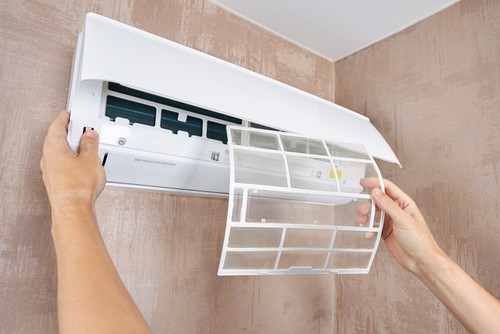
Air filters are essential components of any air conditioning system. Their purpose is to filter out dust, debris, and other particles from the air as it passes through it. Two primary types are washable and disposable; washable filters can be cleaned easily, while disposable ones must be replaced when dirty or clogged.
Effects of Dirty Aircon Filters on Indoor Air Quality
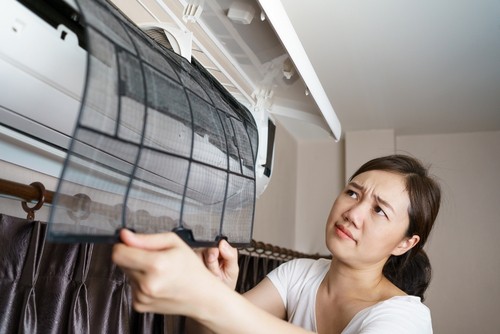
Dirty air filters can have several detrimental effects on indoor air quality. As air passes through a dirty filter, it becomes clogged with dust particles, dirt, and other particles, which reduces its capacity to filter effectively. As a result, air conditioning systems must work harder to circulate air, leading to higher energy consumption and utility bills.
Reduced Air Quality
Dirty air filters have a tremendous effect on indoor air quality. When they become clogged with dirt and particles, these filters become ineffective at filtering out pollutants – leaving dust, pollen, mold spores, and bacteria to circulate freely within the atmosphere. Poor indoor air quality may lead to various health issues like respiratory issues, allergies, or headaches.
Contamination
Dirty air filters reduce air quality and may lead to various health issues. Clogged filters become clogged with dirt and particles, allowing pollutants to circulate freely within the system – leading to indoor environmental contamination as irritants are released into the air and spread throughout a house. Contamination may cause respiratory issues, allergies, headaches, asthma attacks, or worse.
Waste of Energy
As previously discussed, dirty air filters can increase energy use and utility bills. Not only that, but contaminated air also poses serious health risks when released into the environment. Poor indoor air quality has been associated with an increased risk for respiratory illnesses like pneumonia, asthma attacks, and bronchitis.
Increased Energy Consumption
Dirty air filters can significantly increase the energy consumption of an air conditioning system. When they become clogged, the system has to work harder to circulate air, leading to higher utility bills and decreased efficiency of your HVAC unit.
Reduced Lifespan of Air Conditioning System
Dirty air filters can drastically reduce the lifespan of an air conditioning system. When they become clogged, it requires more effort to circulate air, which places additional strain on their components; over time, this leads to breakdowns and other mechanical issues, significantly shortening their service life.
Health Consequences
Dirty air filters can lead to a variety of health problems. Low indoor air quality has been known to trigger respiratory conditions like asthma or bronchitis, headaches, fatigue, and other unpleasant symptoms. Humidity Control: Maintaining optimal humidity levels indoors can prevent the growth of mold and mildew. A dehumidifier may reduce humidity in areas with high moisture content.
Increased Mold Growth Risk
Dirty air filters can also fuel mold growth. Mold thrives in moist environments, and clogged filters trap moisture inside the HVAC system – creating the ideal breeding ground for this harmful organism that can lead to health issues and structural damage.
No Guarantee
Dirty air filters cannot guarantee health benefits, but their presence should warn that something could go awry. Therefore, regular maintenance and cleaning of air filters on an ongoing basis are critical to minimize any adverse health effects that dirtier filters could potentially cause.
Prevention of Dirty Air Filters
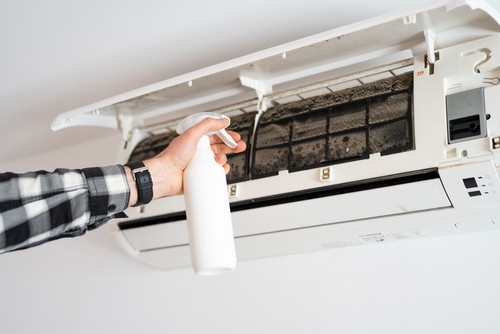
Regular maintenance of air conditioning systems is critical to avoid dirty air filters. Here are some tips for keeping them clean:
Regular Cleaning
Combating dirty aircon filters with regular maintenance is the best strategy. Clean filters at least once a month or more often if used frequently or in dusty environments. Cleaning involves taking the filter from its air conditioning unit and gently washing it with warm water and mild detergent. Once dry, please allow it to air dry entirely before you can.
Professional Maintenance
Regular professional maintenance of air conditioning systems is necessary to prevent dirty filters. A qualified technician can inspect and clean the system, ensuring it runs efficiently and effectively.
Proper Ventilation
Proper ventilation is essential in avoiding dirty air filtersVentilate your air conditioning system regularly to remove pollutants and keep them from accumulating in your AC. Ventilate this system outdoors, away from potential sources of airborne particles.
Regular Maintenance of Cooling Systems
Clean and replace air filters regularly to avoid them becoming dirty. Doing this will guarantee your house receives comfortable air from your cooling or heating system, but simply replacing filters won’t solve the underlying issue: an unclean heating or cooling system itself.
Filter Replacement
If the aircon filter is damaged or too dirty for cleaning, replacing it is recommended. The replacement frequency depends on several factors, including the type of system, usage frequency, and air pollution in the environment. A qualified technician can help you determine an appropriate replacement schedule for your system.
Contamination Control System (CCS)
A Contamination Control System (CCS) can prevent pollutants from entering your home. For instance, if a dirty filter lets in particles, the CCS will capture them and stop them from entering the environment. Some systems are as easy as placing a bucket under an outlet in your kitchen; however, more sophisticated setup and upkeep may be needed.
The Effects of Dirty Aircon Filters on Indoor Air Quality – Conclusion
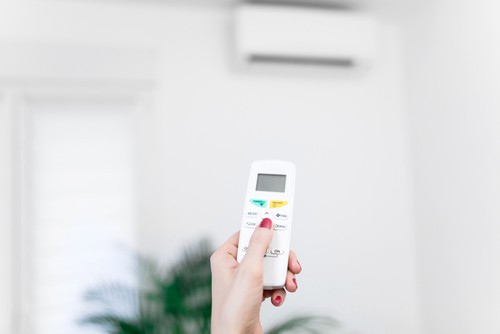
Homeowners can help protect indoor air quality by taking simple measures to stop contamination at its source. Dirty air filters can harm air quality, leading to health problems and increased energy consumption. Regular maintenance of HVAC systems is essential for avoiding dirty filters and promoting good indoor air quality. Following these tips will ensure your system runs efficiently year-round with fresh, comfortable air circulating through it.


